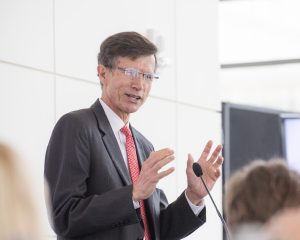Religious Freedom in Indonesia
By Ambassador Robert Blake,* April 27, 2017
Roundtable discussion hosted by the Religious Freedom & Business Foundation, Indonesia’s Leimena Institute, and the Newseum Institute’s Religious Freedom Center.
It is a pleasure to participate in this discussion of Religious Freedom in Indonesia. Let me extend my thanks to the organizers and the Newseum.
This session is timely because religion played an important, perhaps decisive role in the Jakarta gubernatorial elections, as Islamic hardliners rallied support against the sitting Governor Ahok who is a double minority so many wonder whether this portends a longer term trend that will erode Indonesia long tradition of tolerance.
Indonesia’s founding fathers were firm that Indonesia must define itself as a pluralist, multi-religious state when they declared independence in 1945.
— The constitution guarantees freedom of religion and the right to worship according to one’s own beliefs.
— Indonesia recognizes six religious groups: Islam, Catholicism, Protestantism, Buddhism, Hinduism, and Confucianism.
— But members of unofficial groups have the right to establish a place of worship, register marriages and births, and obtain national identity cards.
The State Department and respected independent groups such as the Wahid Institute in Indonesia have documented a decline in tolerance in recent years.
This reflects several factors in my view:
— An increase in discrimination and attacks against unrecognized sects such as Shia and Ahmadis;
— A failure of the State enforcement institutions such as the police to take quick action to stop such attacks and a tendency for the police to view their role as one of preventing violence rather than protecting legal and constitutional rights;
— A tendency on the part of many politicians and even influential groups such as Mohammedia and Nahdatul Ulama to not condemn such actions and the activities of hardline groups such as the Islamic Defenders Front (FPI) for fear of being portrayed as anti-Islamic; and
— The growing use, or misuse of social media.
Overall, however, I remain convinced that the vast majority of Indonesians are tolerant and believe in religious freedom. But it is very important that politicians of all stripes unite now to reaffirm the importance of tolerance and religious freedom as President Jokowi did a few days ago.
This matters not just for Indonesia but for the wider Islamic world because Indonesia must sustain its role as an example of tolerance at a time when much of the rest of the Muslim world faces great challenges to democracy and religious freedom.
* Ambassador Robert Blake served for 31 years in the State Department in a wide range of leadership positions. In 2009, he was nominated by President Obama to be Assistant Secretary of State for South and Central Asia, serving from 2009-2013, for which he was awarded the State Department’s Distinguished Service Award. From 2006-2009, he served concurrently as U.S. Ambassador to Sri Lanka and the Maldives. Prior to that, he served as Deputy Chief of Mission in India from 2003-2006, where he was named the worldwide DCM of the Year by the State Department. Most recently, from 2013-2016, he was the U.S. Ambassador to Indonesia, where he focused on building stronger business and educational ties between the U.S. and Indonesia, while also developing cooperation to help Indonesia reduce greenhouse gas emissions. Ambassador Blake heads McLarty Associates India & South Asia practice, supporting their Southeast Asia and Central Asia practices.
Photos: Maria Bryk, Newseum




